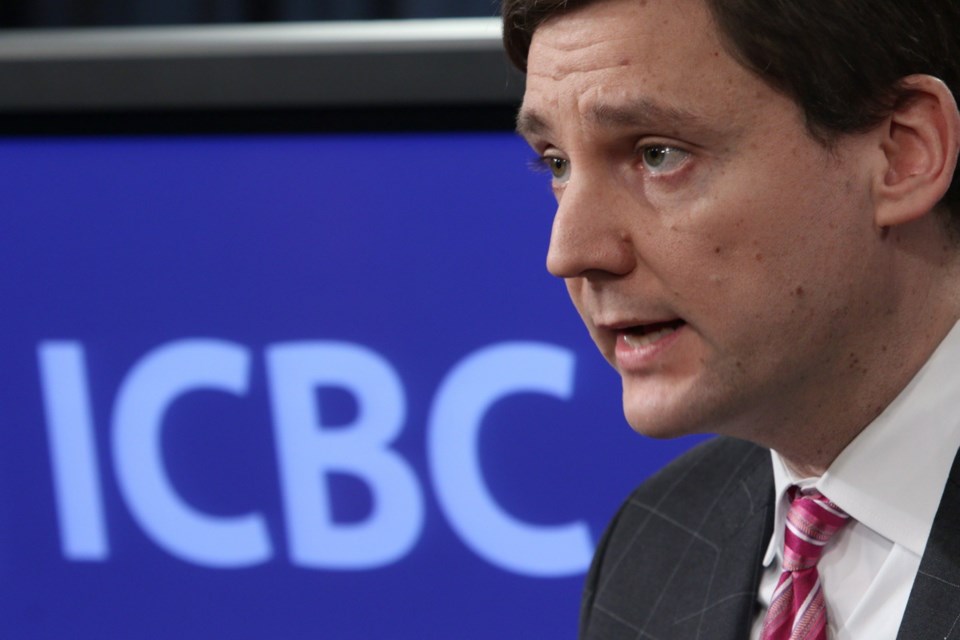The B.C. government is proposing to reduce the number of free at-fault crashes for drivers, lengthen the time it would take to return to basic auto insurance discounts after a crash, and require vehicle owners to register other people who might drive their car, as part of reforms designed to ease the financial crisis at the Insurance Corporation of B.C.
Attorney General David Eby announced public consultation on the ideas Monday, which are likely to be contentious. ICBC is set to lose $1.3 billion this year. The government reforms are an attempt to save the corporation money by changing the insurance system to penalize drivers based on their history of crashes and risky behaviour, rather than the current system which links insurance premiums to actual vehicles.
The proposals involve significant changes to how drivers at fault in a crash are penalized under the current system of basic and optional auto insurance, as well as how many crashes are allowed without penalty, the time it takes to regain insurance discounts, and the discount process available for seniors, new drivers and out-of-province drivers.
Among the options the government is proposing:
Free crashes:
• Allowing only one free at-fault crash (a crash that does not change your insurance premiums) after 20 years of accident free driving, instead of the current 13 years. ICBC says 40 per cent of claims are forgiven each year by drivers who are at their maximum good-driver discounts rates and can have multiple at-fault crashes without their insurance premiums increasing.
• After a free crash, it would take a driver 10 years of crash-free driving before they could accumulate another free crash.
Keeping your discount
• After any crash in which you are at fault, it would take 10 years to return to your pre-crash insurance discount level, rather than the current three years.
• Limit or eliminate the program that allows drivers to repay their vehicle claims bill in an at-fault crash, thereby avoiding an insurance hike. ICBC says 10 per cent of claims are repaid like this year each, hiding the risk level of the driver.
Penalizing drivers of other people's vehicles
• Changing the driver-based model, so that the owner of a vehicle is not penalized if a crash is caused while someone else is driving. Crashes would follow the at-fault driver, not the current system in which the vehicle owner is penalized. ICBC says one in five drivers in a crash are actually driving someone else’s car.
• Owners would be asked to list all the people who might drive their vehicle, when they get their insurance policy. If an unlisted driver causes a crash, ICBC would hit the owner with a “one-time fee” and the at-fault driver would have the crash on their record for 10 years. There may be some exemptions for extraordinary events like a medical emergency. Government’s public consultation suggests fees ranging from $250 to $1,000.
• Owners would get hit with a “more significant” fee if they didn’t list the driver and that person “resides with the owner” such as their son or daughter.
Changing discounts for seniors and new drivers
• Change the discount rate for seniors (a 25 per cent savings on basic insurance for drivers older than 65) after their first at-fault crash, and remove it entirely after a second crash.
• All new residents to B.C. would be levied a “an overall premium surcharge that would apply for the first three years” before they transition into the good driver discount programs available for B.C. drivers.
• Remove the discount for new drivers with 10 year experience after their first at-fault crash.
• Extend the additional discount rates for optional insurance customers who reach 20 years of safe driving, to up to 40 years of discounts. Basic discounts currently max out at eight years of safe driving, and would also be expanded to potentially 40 years of savings, though exact figures on what this would mean were not immediately available.
More expensive driver penalty points
• Hike the cost of driver penalty points and driver risk points by 40 per cent over two years for drivers with multiple serious convictions like excessive spending, distracted driving and impaired driving. That would increase the risk premium on an excessive spending charge from $320 to $448.
• Including driving tickets in optional insurance, meaning a single minor conviction for unsafe lane changes, speeding or not wearing a seatbelt would be allowed over a three-year period, but a second ticket would cause an insurance hike. One conviction of a serious offence, such as distracted driving, would result in an optional insurance hike.
New discount programs
• Offer a 10 per cent discount on basic insurance rates for people who install automatic emergency braking systems, which ICBC says can reduce crashes by up to 56 per cent.
• Create a new 10 per cent basic insurance discount for drivers who drive fewer than 5,000 kilometres a year, but require proof via a photo of their odometer at the beginning and end of their insurance period.
The government public consultation period runs until April 5.
“Drivers have been saying for years that the system would be more fair if low-risk drivers paid less for their vehicle insurance, while high-risk drivers paid more,” Eby said in a statement. “This engagement is one way government is giving drivers the power to shape ICBC and restore public confidence in our public insurer.”



